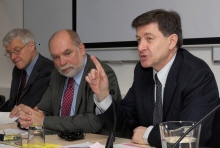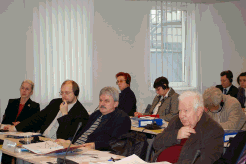
Typical street scene in Santa Ana, El Salvador. (Photo: iStock)
IMF Survey: IMF, European Labor Leaders Meet to Discuss Crisis Response
January 15, 2010
- Seminar aims to draw lessons from policy response in European crisis countries
- Labor leaders, IMF staff compare country experiences with IMF programs
- Event signals stepped-up dialogue between IMF and labor unions
As the number of IMF-supported programs in response to the global financial crisis has grown over the past 15 months, consultation with trade unions has become an increasingly important element of the outreach work conducted by Fund staff.

Guy Ryder (ITUC) speaks at the seminar as Peter Bakvis (ITUC) and Thomas Wieser (Austrian Finance Ministry) look on (photo: Michaela Schrader/IMF)
IMF AND ITUC CONFERENCE
This has been particularly true in Europe, where organized labor is an important social force in many crisis countries.
In an effort to deepen this interaction, labor union leaders from six European countries attended a week-long seminar (January 11-15) at the Joint Vienna Institute (JVI)—a training institute co-sponsored by the Austrian government and the IMF—to discuss the crisis and the policy response undertaken in countries with IMF-supported programs.
The 29 leaders from Bosnia Herzegovina, Hungary, Latvia, Romania, Serbia, and Ukraine represented 14 national union organizations. In addition, three officials from the Brussels-based International Trade Union Confederation (ITUC) attended.

Participants at the
week-long seminar in
Vienna
(photo: Jeremy Mark/IMF)
While union leaders have attended JVI seminars in the past, this was the first event dedicated solely to trade union issues, and it was the first time the ITUC and the IMF co-sponsored a major meeting away from IMF headquarters. IMF officials from Washington and resident representatives based in the program countries participated in the discussions in Vienna.
“This seminar was an important step in the development of relations between the Fund and labor,” said Jeremy Mark, IMF Deputy Chief of Public Affairs, who participated in the event. “The IMF has cooperated closely with the ITUC over the past few years, and has tried to broaden its consultations with national unions in the program countries. But it was very important to bring together under one roof labor leaders from difference countries to compare experiences with Fund programs. This will provide a basis for more effective in-country dialogue as the programs evolve.”
A highlight of the week was a public symposium on the economic outlook for Europe, “From Recession to Recovery.” The speakers included Thomas Wieser, Director General for Economic Policy and Financial Markets at the Austrian Ministry of Finance; ITUC General Secretary Guy Ryder; Engelbert Dockner, professor of finance at Vienna University; Hermine Vidovic, a labor market specialist from the Vienna Institute for International Economic Studies; and Mark Allen of the IMF Regional Office for Central Europe and the Baltics. The off-the-record discussion attracted an audience of 60.
The week-long seminar began with two days of discussion of regional and global issues, and presentations on the IMF response to the crisis. This dialogue allowed the labor leaders to address broader themes that they had in common—including aspects of their relationship with the IMF and the broader challenges for their countries. That was followed by two days of detailed exchanges on each Fund-supported program, using a country-by-country format.
The follow-up to the seminar will involve continued consultations on the programs in each of the countries.


